Semiotext(e)
Semiotext(e)
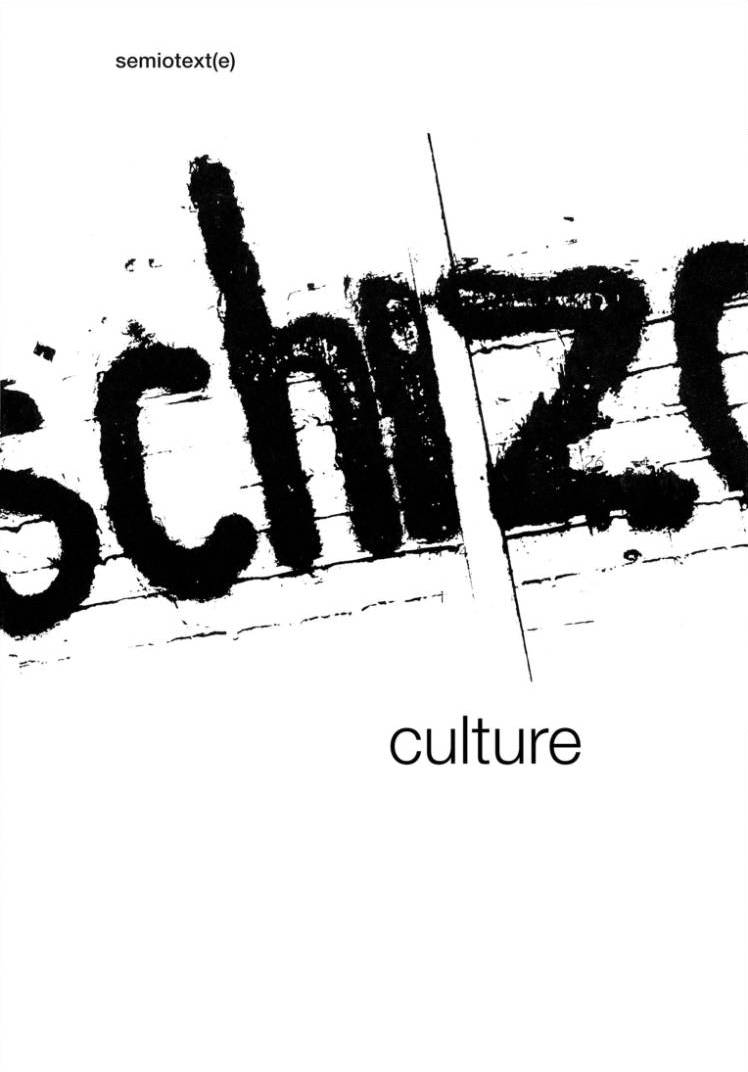
Schizo-Culture: The Event, The Book
Sylvère Lotringer, David Morris
The legendary 1975 "Schizo-Culture" conference, conceived by the early Semiotext(e) collective, began as an attempt to introduce the then-unknown radical philosophies of post-'68 France to the American avant-garde. The event featured a series of seminal papers, from Deleuze's first presentation of the concept of the "rhizome" to Foucault's introduction of his History of Sexuality project. The conference was equally important on a political level, and brought together a diverse group of activists, thinkers, patients, and ex-cons in order to address the challenge of penal and psychiatric institutions. The combination proved to be explosive, but amid the fighting and confusion "Schizo-Culture" revealed deep ruptures in left politics, French thought, and American culture.
The "Schizo-Culture" issue of the Semiotext(e) journal came three years later. Designed by a group of artists and filmmakers including Kathryn Bigelow and Denise Green, it documented the chaotic creativity of an emerging downtown New York scene, and offered interviews with artists, theorists, writers, and No Wave and pre-punk musicians together with new texts from Deleuze, Foucault, R. D. Laing, and other conference participants.
This slip-cased edition includes The Book: 1978, a facsimile reproduction of the original Schizo-Culture publication; and The Event: 1975, a previously unpublished and comprehensive record of the conference that set it all off. It assembles many previously unpublished texts, including a detailed selection of interviews reconstructing the events, and features Félix Guattari, William Burroughs, Kathy Acker, Michel Foucault, Sylvère Lotringer, Guy Hocquenghem, Gilles Deleuze, John Rajchman, Robert Wilson, Joel Kovel, Jack Smith, Jean-François Lyotard, Ti-Grace Atkinson, François Peraldi, and John Cage.

Memory
A spiritual homage to Bernadette Mayer's monumental artwork of the same title, Dorothea Lasky's Memory is a cycle of "poet's essays" stirred by two profound questions. What constitutes personhood and consciousness? What memories get lost, and why?
Expansive in her quest for answers, Lasky launches an inspired investigation of the forces that form our lives and deepest senses of ourselves. She identifies three dimensions of memory—ancestral, personal, and poetic—and in her singularly clear voice, undertakes to enter into their mysteries. From those recesses, she returns with a wide-ranging collection of essays that like lyric poems find the universal inside the particular. Memory reflects on the banal; private emotions and historical trauma; dear departed poets (Diane di Prima, Lucie Brock-Broido); her father's battle with Alzheimer's; and cultural events that have become charged sites of collective reminiscence (the moon landing, the music of Neutral Milk Hotel). Other pieces face the flip side of memory, asking what's left where memory is absent, and what's "real" beyond the horizon of death. The book closes with "Time, the Rose, and the Moon," an ars poetica published here in English for the first time, which offers the ancient symbol of the Ouroboros as a figure for the nonlinear processes of time, memory, and art.
Like Mayer before her, Lasky reveals memory to be huge and haunting, as she accumulates impressions that challenge the very possibility of fixed meaning. "Every rose has the scent of death," she writes. "And poetry is a perfume. That will stay on your body forever.... Whatever happens this time around, remember that."
Dorothea Lasky is the author of six full-length collections of poetry, including, most recently, The Shining (2023). She is also the author of the prose book Animal (2019) and a forthcoming book about Sappho, as well as the editor of Essays (2023) and a coeditor of Open the Door: How to Excite Young People About Poetry (2013). Her writing has appeared in POETRY, The New Yorker, The Paris Review, The Atlantic, and Boston Review, among other places.

Little Joy: Selected Stories
Poet, writer, and translator Cecilia Pavón emerged in the late 1990s as one of the most prolific and central figures of the young Argentine literary scene—the so-called “Generation of the 90s”: artists and writers whose aesthetics and politics were an earnest response to the disastrous impact of American-exported neoliberal policies and the resulting economic crisis of 2001. Their publications were fragile—xeroxed, painted on cardboard—but their cultural impact, indelible.
A cofounder of Buenos Aires’s independent art space and publishing press Belleza y Felicidad—where a whole generation of soon-to-be-famous Argentine artists showed their work for the first time—Pavón pioneered the use of “unpoetic” and intimate content—her verses often lifted from text messages or chat rooms, her tone often impish, yet brutally sincere.
In 2015, Pavón’s first volume of collected poems, ‘A Hotel with My Name’, was published in English. Contemporary writers in the United States, Australasia, and Europe discovered a deep affinity with her work. Pavón’s protagonists, Ariana Reines noted, “are absolute women, guileless dreamers, saints in sneakers, on sidewalks, in jail, in Zara, on buses, in nightclubs, in bed.”
Translated by Pavón’s own poetic protégé Jacob Steinberg, ‘Little Joy’ collects the best of Pavón’s short stories written between 1999-2020, originally published in three volumes in Spanish.

Grand Rapids
Installed alongside the Grand River in downtown Grand Rapids, Michigan, Alexander Calder’s public sculpture La Grande Vitesse has come to symbolize the city. Tess moves there from Ypsilanti, Michigan in 2001—the same year that her mother dies, when everything begins to move, for her, in slow motion. Thrust into adolescence nearly rudderless, fifteen-year-old Tess is intoxicated, angsty, and sexually awake. A decade later, inspired by diary entries and TV reruns, she remembers this summer in the suburbs as the one that redefined her. Its echoes of death are frozen in time like the waves represented in the Calder sculpture or the concrete steps leading down to the churning river. She comes to see Grand Rapids as a collection of architecture and emblems, another home to which she cannot return.
Natasha Stagg is the author of Sleeveless: Fashion, Image, Media, New York 2011–2019 and Surveys: A Novel, both published by Semiotext(e). Her work has appeared in Artforum, Bookforum, Texte Zur Kunst, n+1, Spike Art, Flash Art, Dazed, V, Vice, 032c, and other publications.
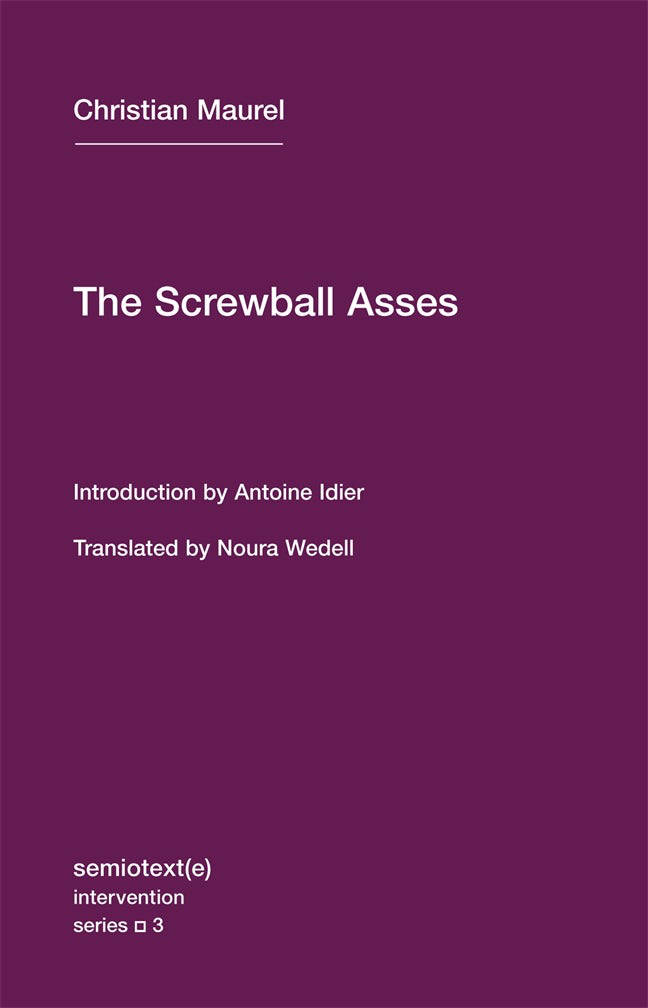
The Screwball Asses and Other Texts
A foundational work of queer theory.
First published anonymously in the notorious "Three Billion Perverts" issue of Félix Guattari's journal Recherches—banned by French authorities upon its release in 1973—The Screwball Asses was erroneously attributed to Guy Hocquenghem when it was first published in English in 2009. This second edition of that translation, with a new preface by Hocquenghem biographer Antoine Idier that clarifies the different theoretical positions within France's Front Homosexuel d'Action Révolutionaire, returns the text to its true author: writer, journalist, and activist Christian Maurel.
In this dramatic treatise on erotic desire, Maurel takes on the militant delusions and internal contradictions of the gay-liberation movement. He vivisects not only the stifled mores of bourgeois capitalism, but also the phallocratic concessions of so-called homophiles and, ultimately, the very act of speaking desire. Rejecting any “pure theory” of homosexuality that would figure its “otherness” as revolutionary, Maurel contends that the ruling classes have invented homosexuality as a sexual ghetto, splitting and mutilating desire in the process. It is only when nondesire and the desire of desire are enacted simultaneously through speech and body that homosexuality can finally be sublimated under the true act of “making love.” There are thousands of sexes on earth, according to Maurel, but only one sexual desire. The Screwball Asses is a revelatory disquisition.
Introduction by Antoine Idier
Translated by Noura Wedell

Resentment: A Comedy
In a novel capturing an era that seems at once familiar and grotesque, a New York writer lands in Los Angeles in 1994.
Originally published in 1997, Resentment was the first in Gary Indiana's now-classic trilogy (followed in 1999 by Three Month Fever: The Andrew Cunanan Story and in 2003 by Depraved Indifference) chronicling the more-or-less permanent state of “depraved indifference” that characterized American life at the millennium's end.
In Resentment, Seth, a New York–based writer arrives in Los Angeles (where he has history and friends) in mid-August, 1994, to observe what will become the marathon parricide trial of the wealthy, athletic, and troubled Martinez brothers, broadcast live every day on Court TV. Still reeling from the end of his obsessive courtship of a young SoHo artist/waiter, Seth moves between a room at the Chateau Marmont and a Mount Washington shack owned by his old cab-driving, ex-Marxist friend, Jack, while he writes a profile of Teddy Wade—one of the era's hottest young actors, who has “dared” to star as a gay character in a new Hollywood film. Studded throughout with scathing satirical portraits of media figures, other writers, and the Martinez trial teams, Resentment captures an era that seems, two decades later, at once grotesque, familiar, and a precursor to our own.
Introduction by Patrick McGrath
Afterword by Chris Kraus
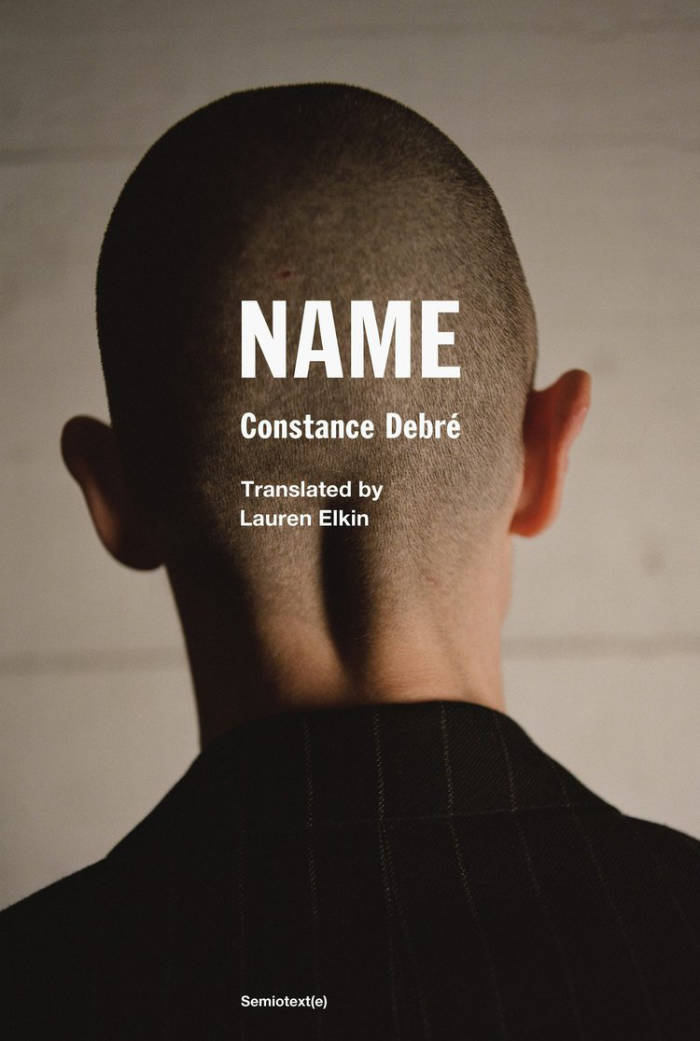
Name
Name, the third novel in Constance Debré’s acclaimed trilogy, is at once a manifesto, an ecstatic poem, and a political pamphlet. By rejecting the notion of given identity, her narrator approaches the heart of the radical emptiness that the earlier books were pursuing.
Newly single, and having recently come out as a lesbian, the narrator of Debré’s first two novels embarked on a monastic regime of exercise, sex, and writing. Using the facts of her own life as impersonal “material” for literature, Playboy and Love Me Tender epitomized what Debré (after Thomas Bernhard) has called “antiautobiography.” They introduced French and American readers to her fiercely spare prose, distilled from influences as disparate as Saint Augustine, Albert Camus, and Guillaume Dustan. “Minimalist and at times even desolate,” wrote the New York Review of Books, these works defied “the expectations of personal growth that animate much feminist literature.”
Name is Debré’s most intense novel yet. Set partly in the narrator’s childhood, it rejects Proustian notions of “regaining” the past. Instead, its narrator seeks a state of profound disownment: “We have to get rid of the idea of origins, once and for all, I’m not holding on to the corpses. … Being free has nothing to do with that clutter, with having suffered or not, being free is the void.” To achieve true freedom, she dares to enter this “void”—that is, dares to accept the pain, loss, and violence of life. Brilliant and searing, Name affirms and extends Debré’s radical project.

Still Black, Still Strong
Dhoruba Bin Wahad, Assata Shakur and 1 more
An essential document of the Black Panther Party written by three leading thinkers and party activists who were jailed following the FBI’S 1969 mandate to destroy the organization “by any means possible.”
Still Black, Still Strong is partly based upon the 1989 videotape Framing The Panthers by producers Chris Bratton and Annie Goldson. It recounts the stories of Dhoruba Bin Wahad, Mumia Abu-Jamal and Assata Shakur, all of whom were arrested and jailed during the COINTELPRO probe of the Black Panther Party.
Dhoruba Bin Wahad, who organized chapters of the Black Panther Party in New York and along the Estern Seaboard and worked with tenants in Harlem and on drug rehabilitation in the Bronx, was accused of murdering two officers while still in his teens and imprisoned for 19 years. He always maintained his innocence and won his freedom by forcing the FBI to release thousands of classified documents proving that he had been framed. The justice department eventually rescinded Bin Wahad’s conviction and he was released in 1990, seven months after the documentary premiered.
Mumia Abu-Jamal, a journalist who headed the Black Panther free breakfast program for inner-city school children in Philadelphia, was also accused of the murder of an officer and sent on death-row, where he still is today.
Assata Shakur was a college educated social worker in her twenties when she was accused of shooting a cop, then arrested and tortured and denied medical treatment. Her interview was conducted in Cuba where she has been exiled since her escape from a New Jersey women’s prison in 1975.
Bin Wahad, Shakur and Abu-Jamal offer a little-known history and an incisive analysis of the Black Panthers’ original goals, which the U.S. Government has tried to distort and suppress. As one confidential, 1969, memo to J. Edgar Hoover put it, “The Negro youth and moderates must be made to understand that if they succumb to revolutionary teaching, they will be dead revolutionaries.”
Edited by Jim Fletcher, Tanaquil Jones and Sylvère Lotringer

hello, world?
Abandoned by their Dutch partner after giving up their home and their job to follow him to the Netherlands, humanities scholar Seasonal finds themself single in a strange place for the first time in a decade.
Dipping into the rabbit hole of digital eroticism, Seasonal soon meets László, a male sub who volleys back their cerebral sexts and is seeking a dominant guide. His dating-app profile—a photo of Foucault and the ingenuous greeting “Hello, World?”—thinly veils his desire to be annihilated. It's a desire that Seasonal senses they can fulfill. But to do this means crossing the frightening gap between their desires and capacities.
Seasonal and László embark on an experiment in remaking intimacy outside the Republic of Gender. But as it continues, the two realize they are staging separate confrontations with domination: Seasonal finds they must confront their own relation to the violence and anger that marked their upbringing in working-class, small-town Australia, while László stages his own confrontation with his decision to leave Viktor Orbán’s Hungary. As they attempt to improvise a theater of domination that opens up possibilities of reciprocity, the energies of their sexuality stalk this collaboration, threatening to give them exactly what they bargained or begged for.
A feminist paean to perversity in the tradition of Pauline Réage’s Story of O and Anaïs Nin's Delta of Venus, Anna Poletti's hello, world? dares to fully inhabit female power, and to fully face the violence, beauty, and uncharted territories of human sexuality.

Airless Spaces
Shulamith Firestone was twenty-five years old when she published The Dialectic of Sex, her classic and groundbreaking manifesto of radical feminism, in 1970. Disillusioned and burned out by the fragmented infighting within the New York City radical feminist groups she’d helped to found, when her book hit the bestseller lists, Firestone decided against pursuing a career as a “professional feminist.” Instead, she returned to making visual art, the profession that she’d trained for. She wouldn’t publish anything again until Airless Spaces, in 1998.
Long before her first hospitalization for paranoid schizophrenia in 1987, Firestone had fallen off the grid and into precarity and poverty. For the next decade, she would move in and out of public psychiatric wards and institutions. Conceived as a series of vignettes about institutions and identity, Airless Spaces is a subtle and deeply literary work. Embedded as a participant-observer, Firestone moves beyond the spectacular and frightening surfaces of institutional life to record individual lives and acts of cruelty and kindness. The existence that she depicts is a microcosm of the world beyond.
After they raised her dose to 42 mg. of Trilafon, Lucy very nearly fainted. She felt a rush of bad sensation comparable to her mental telepathy when her grandmother died. ... But there was a good aspect to fainting too. As she was about to lose consciousness, she felt an overwhelming relief. The black velvety edges of the swoon. If only she could faint all the way, black out, and never wake up again ...
Introduction by Chris Kraus
Afterword by Susan Faludi

Ripcord
A novel about escape and connection, class, sex, and queer intimacy in the American Midwest.
The oldest story: an insider pretends to be an outsider and receives praise for his empathy and imagination and intelligence. Maybe some asshole even says bravery. An outsider pretends to be an insider, is exposed as a fraud, a liar, and burned to the ground.
In Ripcord, Nate Lippens continues his meditations on escape and connection, class, sex, and intimacy. Stuck in Milwaukee, the narrator cobbles together a living by bartending and catering weddings, enmeshed in a semiaffair with a younger, married man. Cruising apps while tallying his youthful romantic failures, he fantasizes about disappearance but finds both solace and frustration in his friendships with Charlie, an aging punk who was prominent in the 1990s Chicago queercore scene, and Greer, a painter who never broke through but continues making work.

Selected Amazon Reviews
A book-length selection from Kevin Killian's legendary corpus of more than two thousand product reviews posted on Amazon.com.
An enchanting roll of duct tape. Love Actually on Blu-ray Disc. The Toaster Oven Cookbook, The Biography of Stevie Nicks, and an anthology of poets who died of AIDS. In this only book-length selection from his legendary corpus of more than two thousand product reviews posted on Amazon.com, sagacious shopper Kevin Killian holds forth on these household essentials and many, many, many others.
The beloved author of more than a dozen volumes of innovative poetry, fiction, drama, and scholarship, Killian was for decades a charismatic participant in San Francisco's New Narrative writing circle. From 2003–2019, he was also one of Amazon's most prolific reviewers, rising to rarefied “Top 100” and “Hall of Fame” status on the site. Alternately hilarious and heartfelt, Killian's commentaries consider an incredible variety of items, each review a literary escapade hidden in plain sight amongst the retailer's endless pages of user-generated content. Selected Amazon Reviews at last gathers an appropriately wide swath of this material between two covers, revealing the project to be a unified whole and always more than a lark.
Some for “verified purchases,” others for products enjoyed in theory, Killian's reviews draw on the influential strategies of New Narrative, his unrivaled fandom for both elevated and popular culture, and the fine art of fabulation. Many of them are ingeniously funny—flash-fictional riffs on the commodity as talismanic object, written by a cast of personas worthy of Pessoa. And many others are serious, even scholarly—earnest tributes to contemporaries, and to small-press books that may not have received attention elsewhere, offered with exemplary attention. All of Killian's reviews subvert the Amazon platform, queering it to his own play with language, identity, genre, critique.
Killian's prose is a consistent pleasure throughout Selected Amazon Reviews, brimming with wit, lyricism, and true affection. As the Hall of Famer himself reflected on this form-of-his-own-invention shortly before his untimely passing in 2019: “They're reviews of a sort, but they also seem like novels. They're poems. They're essays about life. I get a lot of my kinks out there, on Amazon.”
Introduction by Wayne Koestenbaum
Afterword by Dodie Bellamy

Crazy for Vincent
Diary, memoir, poem, fiction? Autopsy, crime scene, hagiography, hymn? The chronicle of an obsessive love. In the middle of the night between the 25th and 26th of November, Vincent fell from the third floor playing parachute with a bathrobe. He drank a liter of tequila, smoked Congolese grass, snorted cocaine...
Crazy for Vincent begins with the death of the figure it fixates upon: Vincent, a skateboarding, drug-addled, delicate "monster" of a boy in whom the narrator finds a most sublime beauty. By turns tender and violent, Vincent drops in and out of French writer and photographer Hervé Guibert's life over the span of six years (from 1982, when he first met Vincent as a fifteen-year-old teenager, to 1988). After Vincent's senseless death, the narrator embarks on a reconnaissance writing mission to retrieve the Vincent that had entered, elevated, and emotionally eviscerated his life, working chronologically backward from the death that opens the text. Assembling Vincent's fragmentary appearances in his journal, the author seeks to understand what Vincent's presence in his life had been: a passion? a love? an erotic obsession? or an authorial invention? A parallel inquiry could be made into the book that results: Is it diary, memoir, poem, fiction? Autopsy, crime scene, hagiography, hymn? Crazy for Vincent is a text the very nature of which is as untethered as desire itself.
Hervé Guibert (1955-1991) was a writer, a photography critic for Le Monde, a photographer, and a filmmaker. In 1984 he and Patrice Chereau were awarded a César for best screenplay for L'Homme Blessé. Shortly before his death from AIDS, he completed La Pudeur ou L'impudeur, a video work that chronicles the last days of his life.

If You're a Girl: Selected Stories 1985–2023
The trailblazing book that influenced a generation of writers, and proves that mature reflection needn't be lacking in attitude.
In the beginning when everything was very sexual we talked about our fantasies. She thought about having a guy for some of it. She thought about having a gun. I had gone through a lot to get away from guys so I admit that the thought of going back to them, even for a little adventure, was surprising and disconcerting …
Ann Rower's first book, If You're a Girl, published by Semiotext(e)'s Native Agents series in 1991 in tandem with Cookie Mueller's Walking Through Clear Water in a Pool Painted Black, cemented her reputation as the Eve Babitz of lower Manhattan.
Rower was fifty-three years old at the time. Her stories—urtexts of female autofiction—had long been circulating within the poetry and postpunk music scenes. They were unlike anyone else's: disarming, embarrassing, psuedoconfessional tales of everyday life dizzily told and laced with dry humor. In If You're a Girl, she recounts her adventures as Timothy Leary's babysitter, her artistic romance with actor Ron Vawter, and her attempts to evade a schizophrenic stalker.
Rower went on to publish two novels: Armed Response (1995) and Lee & Elaine (2002). After the 2002 suicide of her partner, the writer Heather Lewis, Rower stopped writing for almost two decades. And then she picked up where If You're a Girl left off. No longer a girl, she produced dozens of stories from her life in New York as an octogenarian.
This new, expanded edition includes most of the original book, together with selections from both her novels and her recent writings. If You're a Girl is a trailblazing book that manifests Rower's influence on a generation of writers, and proves that mature reflection needn't be lacking in attitude.
Ann Rower is the author of If You're A Girl, Armed Response, and Lee & Elaine. She received a PhD from Columbia University in sixteenth-century English literature in 1974, and has collaborated with the Wooster Group as a writer. Rower taught writing in New York at the School for Visual Arts between 1974 and 2019.
Introduction by Sheila Heti.

Playboy
The prequel to Love Me Tender, narrating Debré's transformation from affluent career woman to broke single lesbian and writer.
I see all her beauty, I see the beauty of women. I see my own body, new. I tell myself there are so many things that are possible.
First published in France in 2018, Playboy is the first volume of Constance Debré's renowned autobiographical trilogy that describes her decision, at age forty-three, to abandon her marriage, her legal career, and her bourgeois Parisian life to become a lesbian and a writer.
The novel unfolds in a series of short, sharp vignettes. The narrator's descriptions of her first female lovers—a married woman fifteen years older than her, a model ten years her junior—are punctuated by encounters with her ex-husband, her father, and her son.
As Debré recently told Granta: “It was a bit like Saint Augustine and his conversion. In the same week, I had sex with a girl and I had the feeling that I could write. I had this incredible feeling that I could catch things, that life was there to be caught.”
Looking at the world through fresh eyes, the narrator of Playboy questions everything that once lay beneath the surface of her well-managed life. Laconic, aggressive, and radically truthful, she examines gender and marriage, selfishness and sacrifice, money and family, even the privilege inherent in her downward mobility.
Writing her way toward her own liberation, Debré chronicles the process that made her one of the most brilliant, important French writers today.

Notice
A classic queer text of trauma, written by one of the most talented novelists of her generation.
Published by Doubleday in 1994, Heather Lewis's chilling debut novel took place on the northeastern equestrian show-riding circuit, to which Lewis herself belonged in her teens. Expelled from boarding school, its fifteen-year-old narrator moves numbly through a world of motel rooms, heroin, dyke love, and doped horses. Kirkus Reviews found it “brutal, sensual, honest, seductive … a powerful debut,” while the New York Times found the book “grating and troublesome … it's difficult to imagine a more passive specimen.”
Almost immediately, Lewis began writing Notice, a novel that moves even further into dark territory. The teenaged narrator Nina begins turning tricks in the parking lot of the train station near the Westchester County home of her absent parents. She soon falls into a sadomasochistic relationship with a couple. Arrested, she's saved by a counselor and admitted to a psychiatric facility. But these soft forms of control turn out to be even worse. Writing in the register of an emotional fugue state, Notice's helpless but all-knowing narrator is as smooth and sharp as a knife.
Rejected by every publisher who read it during Lewis's life, Notice was eventually published by Serpent's Tail in 2004, two years after her death. The book, long out of print, emerged as a classic queer text of trauma, written by one of the most talented novelists of her generation.

Heroines, New Edition
A manifesto reclaiming the wives and mistresses of literary modernism that inspired a generation of writers and scholars, reissued after more than a decade.
On the last day of December 2009, Kate Zambreno, then an unpublished writer, began a blog called "Frances Farmer Is My Sister," arising from her obsession with literary modernism and her recent transplantation to Akron, Ohio, where her partner held a university job. Widely reposted, Zambreno's blog became an outlet for her highly informed and passionate rants and melancholy portraits of the fates of the modernist “wives and mistresses," reclaiming the traditionally pathologized biographies of Vivienne Eliot, Jane Bowles, Jean Rhys, and Zelda Fitzgerald: writers and artists themselves who served as male writers' muses only to end their lives silenced, erased, and institutionalized. Over the course of two years, Frances Farmer Is My Sister helped create a community of writers and devised a new feminist discourse of writing in the margins and developing an alternative canon.
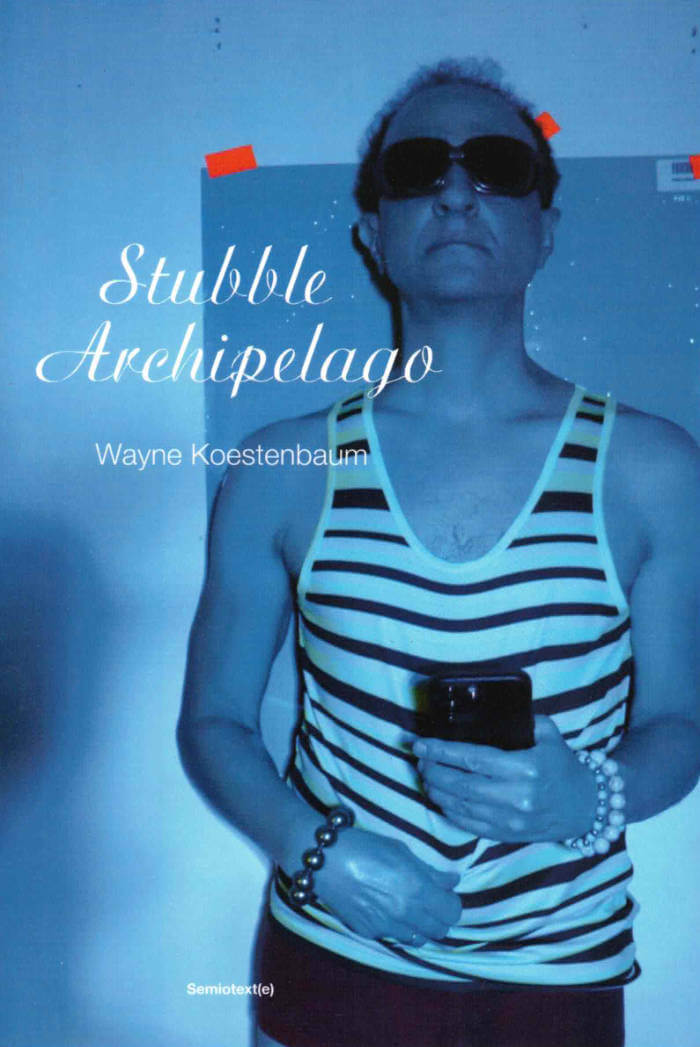
Stubble Archipelago
Wild new adventures in word-infatuated flânerie from a celebrated literary provocateur.
This book of thirty-six poetic bulletins by the humiliation-advice-giver Wayne Koestenbaum will teach you how to cruise, how to dream, how to decode a crowded consciousness, how to find nuggets of satisfaction in unaccustomed corners, and how to sew a language glove roomy enough to contain materials gathered while meandering.
Koestenbaum wrote many of these poems while walking around New York City. He'd jot down phrases in a notebook or dictate them into his phone. At home, he'd incorporate these fragmented gleanings into overflowing quasi sonnets. Therefore each poem functions as a coded diary entry, including specific references to sidewalk events and peripatetic perceptions. Flirting, remembering, eavesdropping, gazing, squeezing, sequestering: Koestenbaum invents a novel way to cram dirty liberty into the tight yet commodious space of the sonnet, a fourteen-lined cruise ship that contains ample suites for behavior modification, libidinal experiment, aura-filled memory orgies, psychedelic Bildungsromane, lap dissolves, archival plunges, and other mental saunterings that conjure the unlikely marriage of Kenneth Anger and Marianne Moore. Carnal pudding, anyone? These engorged lyrics don't rhyme; and though each builds on a carapace of fourteen lines, many of the lines spawn additional, indented tributaries, like hoop earrings dangling from the stanzas' lobes.
Koestenbaum's poems are comic, ribald, compressed, symphonic. They take liberties with ordinary language, and open up new pockets for sensation in the sorrowing overcoat of the “now.” Imagine: the training wheels have been removed from poetry's bicycle, and the wheeling flâneur is finally allowed a word pie equal to fantasy's appetite. Stubble—a libidinal detail—matters when you're stranded on the archipelago of your most unsanctioned yet tenaciously harbored impulses.
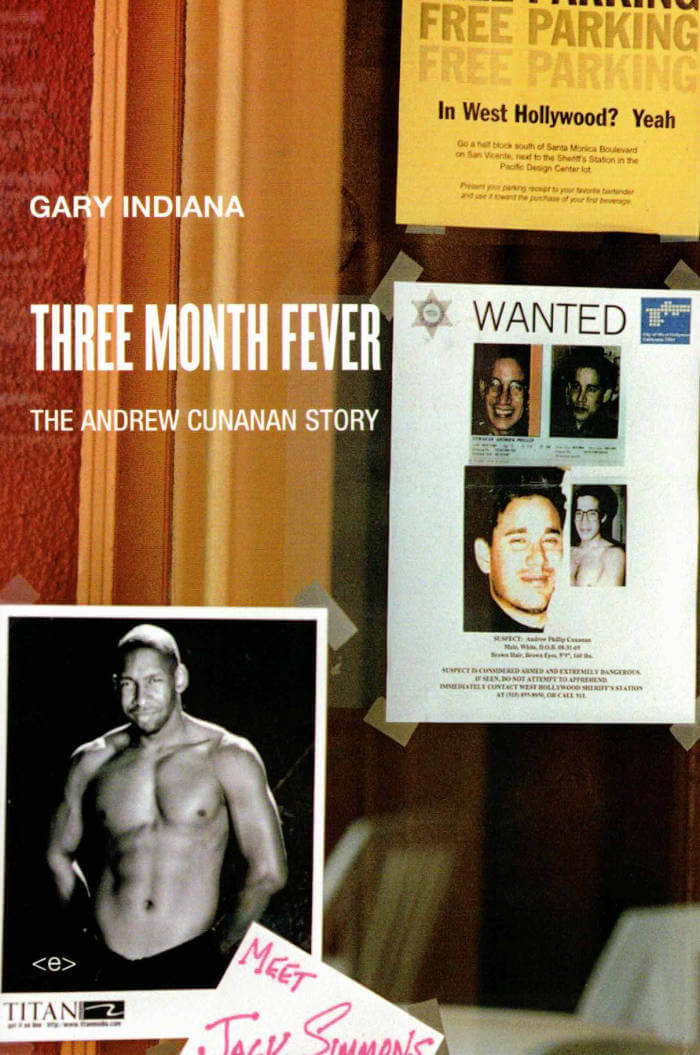
Three Month Fever: The Andrew Cunanan Story
A sardonic and artful reconstruction of the brief life of the party boy who became a media sensation for shooting Gianni Versace.
First published in 1999, Gary Indiana's Three Month Fever is the second volume of his famed crime trilogy, now being republished by Semiotext(e). (The first, Resentment, reissued in 2015, was set in a Menendez trial-era L.A.) In this brilliant and gripping hybrid of narrative and reflection, Indiana considers the way the media's hypercoverage transformed Andrew Cunanan's life “from the somewhat poignant and depressing but fairly ordinary thing it was into a narrative overripe with tabloid evil.”
“America loves a successful sociopath,” Indiana explains. This sardonic and artful reconstruction of the brief life of the party boy who became a media sensation for shooting Gianni Versace is a spellbinding fusion of journalism, social commentary, and novelistic projection. By following Cunanan's notorious “trail of death,” Indiana creates a compelling portrait of a brilliant, charismatic young man whose pathological lies made him feel more like other people—and more interesting than he actually was. Born in a working-class exurb of San Diego and educated at an elite private school, Cunanan strove to “blend in” with the upscale gay male scene in La Jolla. He ended up crazed and alone, eventually embarking on a three-month killing spree that took the lives of five men, including that of Versace, before killing himself in a Miami boathouse, leaving behind a range of unanswerable questions and unsolvable mysteries.

Whites, Jews, and Us: Toward a Politics of Revolutionary Love
A scathing critique of the Left from an indigenous anti-colonial perspective.
With Whites, Jews, and Us, Houria Bouteldja launches a scathing critique of the European Left from an indigenous anti-colonial perspective, reflecting on Frantz Fanon's political legacy, the republican pact, the Shoah, the creation of Israel, feminism, and the fate of postcolonial immigration in the West in the age of rising anti-immigrant populism. Drawing upon such prominent voices as James Baldwin, Malcolm X, and Jean Genet, she issues a polemical call for a militant anti-racism grounded in the concept of revolutionary love.
Such love will not come without significant discomfort for whites, and without necessary provocation. Bouteldja challenges widespread assumptions among the Left in the United States and Europe—that anti-Semitism plays any role in Arab-Israeli conflicts, for example, or that philo-Semitism doesn't in itself embody an oppressive position; that feminism or postcolonialist theory is free of colonialism; that integrationalism is a solution rather than a problem; that humanism can be against racism when its very function is to support the political-ideological apparatus that Bouteldja names the "white immune system."
At this transitional moment in the history of the West—which is to say, at the moment of its decline—Bouteldja offers a call for political unity that demands the recognition that whiteness is not a genetic question: it is a matter of power, and it is high time to dismantle it.
"Why am I writing this book? Because I share Gramsci's anxiety: "The old are dying and the new cannot be born; in this interregnum a great variety of morbid symptoms appear." The fascist monster, born in the entrails of Western modernity. Of course, the West is not what it used to be. Hence my question: what can we offer white people in exchange for their decline and for the wars that will ensue? There is only one answer: peace. There is only one way: revolutionary love." — from Whites, Jews, and Us
This Semiotext(e)/Intervention series English-language edition includes a foreword by Cornel West.

Nicolas Pages
An ode to mad love, awarded the Prix de Flore in 1999.
Published in 1999 and awarded that year's Prix de Flore, Nicolas Pages marks a departure from the Sadean preoccupations of Guillaume Dustan's first three novels; it is, in essence, a love story. Inspired by a failed romance with the Swiss artist-writer Nicolas Pages and collaging texts that Dustan initially produced for a wide variety of other occasions (magazine articles, short stories, project notes, shopping lists, and more), the "auto-/bio-/porno-graphic" prose of Nicolas Pages is by turns trashy and encyclopedic, corporeal and philosophical. Here Dustan inaugurates a "gay literature" that is no longer painful or shameful, but epicurean and cheerful without ever lapsing into idealism. A vibrant plea for gay rights and a tapestried text that is more than the sum of its many styles, Nicolas Pages is a call to explore the body, sexuality, and writing in all their variety; it is a hymn to life, humanity, pleasure, and desire.

Alien Daughters Walk Into the Sun: An Almanac of Extreme Girlhood
The early writings of renowned poet and critical theorist Jackie Wang, drawn from her early zines, indie-lit crit, and prolific early 2000s blog.
Compiled as a field guide, travelogue, essay collection, and weather report, Alien Daughters Walk into the Sun traces Jackie Wang's trajectory from hard femme to Harvard, from dumpster dives and highway bike rides to dropping out of an MFA program, becoming a National Book Award finalist, and writing her trenchant book Carceral Capitalism. Alien Daughters charts the dream-seeking misadventures of an "odd girl" from Florida who emerged from punk houses and early Tumblr to become the powerful writer she is today. Anarchic and beautifully personal, Alien Daughters is a strange intellectual autobiography that demonstrates Wang's singular self-education: an early life lived where every day and every written word began like the Tarot's Fool, with a leap of faith.
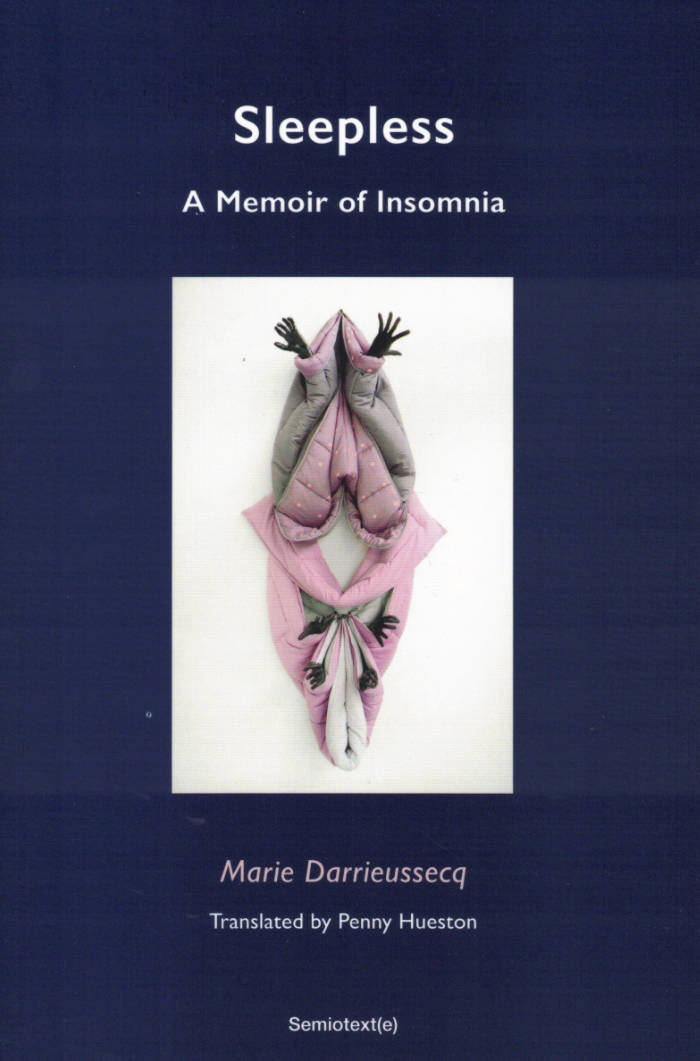
Sleepless: A Memoir of Insomnia
A restless inquiry into the cultural and psychic sources of insomnia by one of contemporary French literature's most elegant voices.
Plagued by insomnia for twenty years, Marie Darrieussecq turns her attention to the causes, implications, and consequences of sleeplessness: a nocturnal suffering that culminates at 4 a.m. and then defines the next day. “Insomniac mornings are dead mornings,” she observes. Prevented from falling asleep by her dread of exhaustion the next day, Darrieussecq turns to hypnosis, psychoanalysis, alcohol, pills, and meditation. Her entrapment within this spiraling anguish prompts her inspired, ingenious search across literature, geopolitical history, psychoanalysis, and her own experience to better understand where insomnia comes from and what it might mean. There are those, she writes, in Rwanda, whose vivid memories of genocide leave them awake and transfixed by complete horror; there is the insomnia of the unhoused, who have nowhere to put their heads down. The hyperconnection of urban professional life transforms her bedroom from a haven to a dormant electrified node.
Ranging between autobiography, clinical observation, and criticism, Sleepless is a graceful, inventive meditation by one of the most daring, inventive novelists writing today.

Artless: Stories 2019-2023
Composed of stories, fragmentary essays, and even press releases Stagg has been commissioned to write, Artless captures the media landscape lived and generated in New York during the past half decade. Since the 2016 publication of her debut novel Surveys, Stagg has positioned herself as an in-demand expert on, and critic of, the psychic experience of self-mythology within the cruelly optimistic metaverse of infinite branding. Part voyeur and part participant, Stagg continues her exploration of the branded identity and its elusive, bottomless desire for authenticity.
Natasha Stagg is the author of a novel, Surveys, and a collection, Sleeveless: Fashion, Image, Media, New York 2011-2019. Her essays have appeared in the books Excellences and Perfections, Link in Bio: Art After Social Media, You Had To Be There: Rape Jokes, Intersubjectivity Vol. II: Scripting the Human, and 9th Berlin Biennale for Contemporary Art: The Present in Drag, among others.